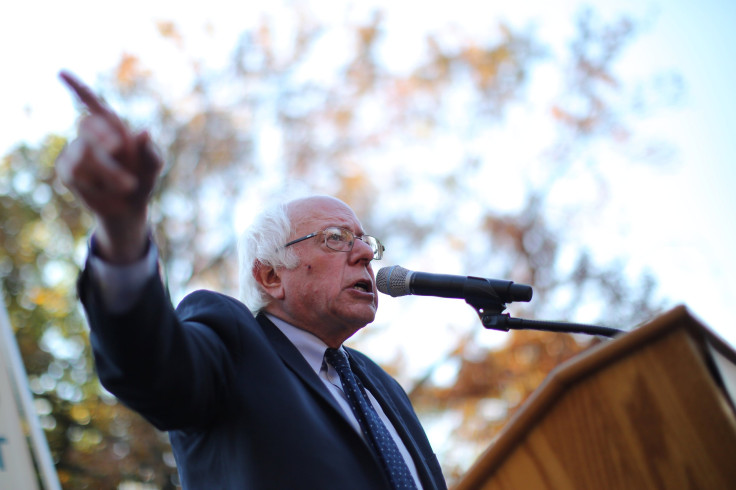Alexandria Ocasio-Cortez, Bernie Sanders Seek 15% Cap On Credit Card, Loan Interest

The first major legislation Freshman Rep. Alexandria Ocasio-Cortez, D-N.Y., has introduced to lower interest rates banks charge on credit cards and other loans to 15% likely won’t pass the Republican-controlled Senate this legislative session, but will stand a much greater chance if Democrats gain Senate seats and the White House in 2020.
The Washington Post reported on Friday that Ocasio-Cortez and Sen. Bernie Sanders, I-VT, who is a frontrunner in the Democratic nomination for president, have teamed up to propose a two-page Loan Shark Protection Act. Ocasio-Cortez took to Twitter on Thursday to argue that “there is no reason a person should pay more than 15% in interest in the United States.”
She added borrowers with low credit scores are not the only ones to pay high interest rates. Even borrowers with excellent credit ratings pay higher rates than they did a decade ago.
I am incredibly proud of my friends @AOC & @BernieSanders for this new legislation they have crafted that will cap the interest rates on payday loans and credit cards @ 15%.
— Shaun King (@shaunking) May 9, 2019
Americans have over a TRILLION dollars in credit card debt.
It's outrageous.https://t.co/MuCh4gimiC
Sanders has raised the proposed legislation before, during his 2016 bid for the presidency, as well as in 2009 during congressional debate over the CARD Act, which added modest protections for credit card users. Sanders also tweeted on Thursday that interest rates were too high and that together with Ocasio-Cortez, “We are introducing legislation to challenge the greed of Wall Street and protect consumers across America.”
Credit card interest rates are outrageously high. With @RepAOC, we are introducing legislation to challenge the greed of Wall Street and protect consumers across America. https://t.co/eFltL754AG
— Bernie Sanders (@SenSanders) May 9, 2019
Since taxpayers bailed out "too-big-to-fail" banks in the wake of the 2008 recession, banks have steadily raised credit card interest rates under the guise of providing credit to riskier borrowers and to shore up reserves in advance of another recession. The banking industry, including JP Morgan Chase and Bank of America, both of which received huge bailouts, generated $113 billion in credit card interest and fees in 2017. That’s up 35% from 2012, according to S&P Global Market Intelligence.
Congress imposed a 15% interest cap on credit unions in 1980, and the National Credit Union Administration, which regulates the industry, raised that rate to 18% in 1987 and has maintained it at that level since, the Post reported.
The banking industry, however, has so far evaded such limits in recent decades and is expected to vigorously resist the proposed changes. Prior to 1980, most states had some form of usury laws – referencing the biblical term for loaning money at exorbitant rates – dating back to the National Bank Act of 1863-64. In California, for instance, the usury rate is set at 30% and banks are prohibited from making loans or issuing credit cards with higher rates.
A federal cap on credit card interest would reverse a 1978 Supreme Court ruling in Marquette National Bank of Minneapolis v. First of Omaha Service Corporation. At the time, First of Omaha mailed out unsolicited credit cards to potential credit customers in other states with the higher interest rates allowed in Nebraska. Unsolicited credit offers were common practice at the time.
The court ruled despite Minnesota’s stricter usury laws, states could not govern national banks; the federal Comptroller of the Currency governed them. This spawned a competitive credit card issuing industry, with large national banks headquartering in low regulation states such as South Dakota and Delaware that allowed them to charge higher interest rates.
A secondary industry, the payday-loan industry, where interest rates can be as high as 667%, also grew out of this ruling. The proposed legislation would effectively end the payday loan industry by a potential banking plan through the U.S. Post Office which, again, was a successful and long-established program that ran from 1911 until it was terminated by Congress in 1966.
“This specific proposal will only harm consumers by restricting access to credit for those who need it the most and driving them toward less regulated, more costly alternatives," Jeff Sigmund, a spokesman for the American Bankers Association, said in a statement.
Another industry spokesman, Richard Hunt, of the Consumer Bankers Association, that includes J.P. Morgan Chase and Bank of America, argued a one-size-fits-all cap would make loans harder for all Americans with non-traditional incomes and less than stellar credit scores.
© Copyright IBTimes 2025. All rights reserved.





















